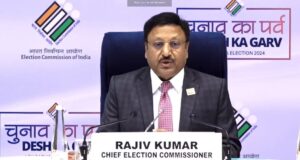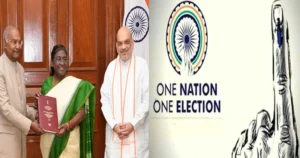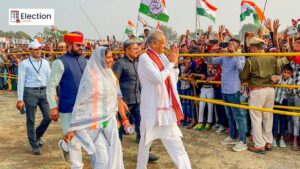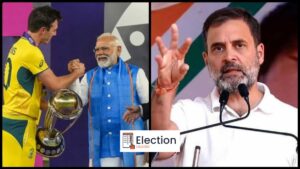Modi vs. ‘INDIA’: Who Will Win the 2024 General Elections?
The Indian political landscape has always been a vibrant and dynamic arena where elections are like festivals, and the results can change the course of the nation’s destiny. The 2024 General Elections in India promise to be yet another momentous event, with a fierce battle shaping up between the charismatic incumbent Prime Minister, Narendra Modi, and the collective will and aspirations of the nation, aptly personified as ‘INDIA’. As we delve into this intriguing political showdown, we must consider the factors that will determine the eventual winner.
Modi’s Stature (2024 General Elections)
Narendra Modi has been in charge of Indian politics for over ten years. He is a seasoned politician with a contentious disposition. When he was elected in 2014, he ran on a platform of economic reforms, nationalism, and development and made the promise of “Acche Din” (Good Days). A surprise victory in 2019 solidified his status as one of India’s most significant leaders. Modi’s popularity has persisted thanks in part to the BJP’s (Bharatiya Janata Party) efficient political system, charisma, and dynamic leadership.
The “Make in India,” “Swachh Bharat Abhiyan,” and “Digital India” programs are just a few of the ambitious ones that Modi’s administration has introduced. Additionally, he has demonstrated a predilection for interacting with world leaders, enhancing India’s standing abroad. These successes have improved his reputation among many Indians, who see him as a strong and capable leader.
‘INDIA’ – A Confluence of Aspirations
On the other side of the political spectrum, we have ‘INDIA,’ symbolizing the collective aspirations of the people. The 2024 General Elections are significant because they represent a crucial moment in India’s history. The electorate is increasingly young, diverse, and well-informed. The nation’s youth, in particular, seeks a more inclusive, progressive, and ecologically responsible government.
Issues such as economic disparity, unemployment, education, healthcare, and climate change have come to the forefront of public discourse. Citizens demand not just economic growth but also equitable distribution of wealth, access to quality education and healthcare, and environmental sustainability.
A Diverse Electorate
India is a vast and diverse country, comprising people from different regions, languages, religions, and cultures. As a result, elections in India often hinge on regional dynamics. While Modi has a strong pan-Indian appeal, the opposition has been successful in forming alliances with regional parties, which could potentially erode his dominance.
Key Players in the Opposition (2024 General Elections)
The opposition, often criticized for its disarray, has managed to forge strategic alliances and build coalitions to challenge the BJP. Leaders such as Rahul Gandhi, Mamata Banerjee, Sharad Pawar, and Akhilesh Yadav have emerged as influential figures. Their ability to unite and put up a strong front will be a determining factor in the upcoming elections.
Issues that Matter
In the 2024 General Elections, issues that resonate with the electorate will play a pivotal role. The handling of the COVID-19 pandemic, economic recovery post-pandemic, and the delivery of healthcare services will be closely scrutinized. Additionally, climate change and environmental sustainability have gained traction as pressing concerns, with a growing section of the population advocating for more environmentally responsible policies.
The Economy and Unemployment
India’s economic landscape is a critical factor in determining the election outcome. The government’s ability to stimulate economic growth, create jobs, and address income inequality will be under the microscope. Many young Indians are looking for opportunities and job security, and the party that can effectively address these concerns will gain favor.
Social Cohesion and Religious Tensions
Another factor that cannot be ignored is the complex issue of social cohesion in a diverse nation like India. Tensions along religious and ethnic lines have at times flared up, and the electorate is keenly aware of the importance of preserving India’s secular fabric. A government’s ability to maintain social harmony and unity will be an important consideration for voters.
The Role of Social Media and Technology
The role of social media in shaping public opinion has grown significantly. Leaders and parties that can effectively utilize digital platforms to connect with the electorate will have an advantage. Misinformation and fake news are concerns, and the ability to counter them with facts and effective communication will be crucial.
Conclusion
As India hurtles toward the 2024 General Elections, the stage is set for a riveting contest between Narendra Modi and the collective aspirations of the nation. While Modi’s charisma and strong leadership have been formidable, ‘India aspires for more inclusive, sustainable, and equitable governance. The outcome will depend on how effectively the opposition can address these aspirations, build strategic alliances, and resonate with a diverse electorate.
The 2024 General Elections is not just about personalities; it’s about policies, progress, and the path India chooses for its future. It’s about the India of today and the India that its citizens envision for tomorrow. Ultimately, the winner will be determined by the wisdom of the electorate and the party that best captures the spirit and hopes of ‘INDIA.’






